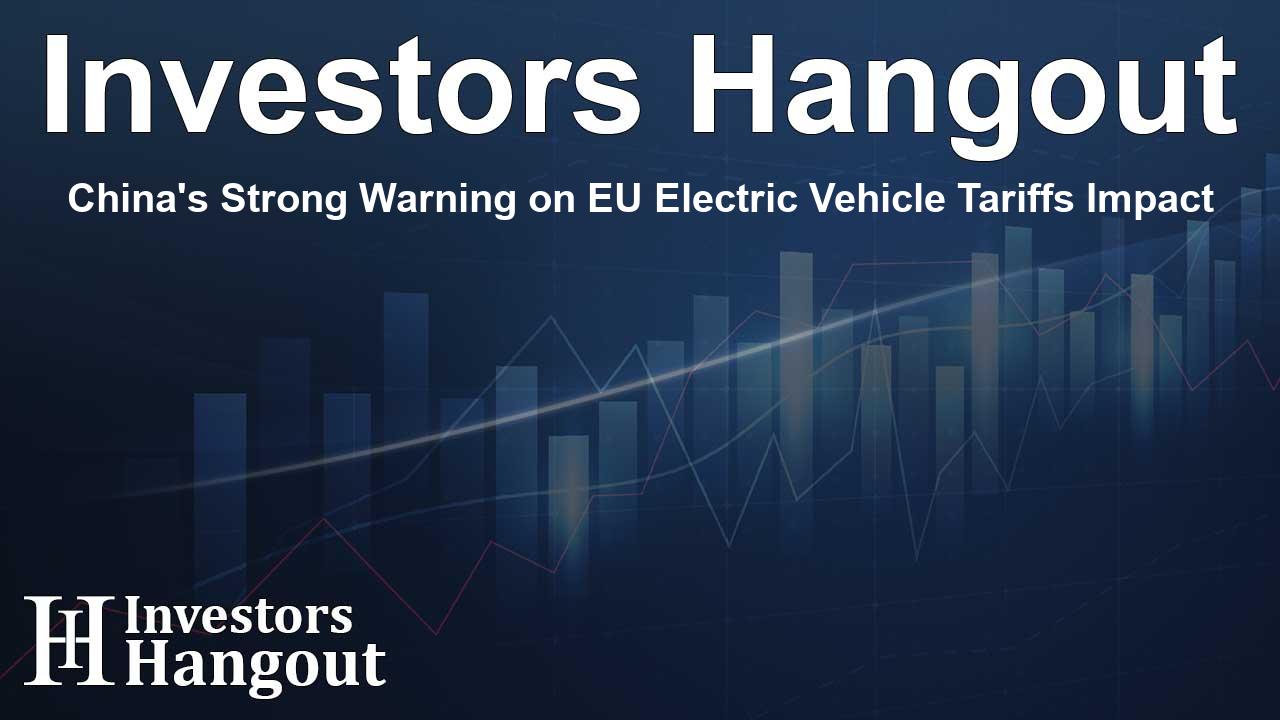China's Strong Warning on EU Electric Vehicle Tariffs Impact

China's Concerns Over EU Electric Vehicle Tariffs
Ahead of the European Union's decision regarding tariffs on electric vehicles (EVs) from China, officials have raised significant alarms about the impact on trade, particularly with Germany.
Recent Developments in Trade Discussions
According to reports, China's commerce minister, Wang Wentao, has highlighted the potential disruption that new tariffs could bring, signaling that the implications may interfere with both trade and investment opportunities. During a recent dialogue with German Vice Chancellor and Economic Minister Robert Habeck, he stressed the importance of adhering to World Trade Organization norms to prevent worsening relations between China and the EU.
Specifics of Proposed Tariffs
The European Commission is poised to implement final tariffs reaching up to 35.3% on Chinese-made EVs, on top of the existing 10% duty on car imports. Wang is currently in Europe to engage in discussions regarding the EU's anti-subsidy investigation targeting Chinese EVs prior to a crucial vote on additional tariff measures.
Efforts for Cooperative Solutions
Wang is advocating for Germany’s support in fostering a collaborative approach that could lead to a mutually beneficial outcome between the European Commission and China. In response, Habeck expressed Germany's stance in favor of free trade, demonstrating openness to Chinese automotive investments in Europe. He committed to pushing for resolutions that could avert potential trade disputes.
Continued Dialogue Amidst Trade Tensions
Wang also engaged with Wolfgang Schmidt from the German Chancellery, reiterating China’s commitment to resolving the anti-subsidy issue through ongoing dialogue. Despite feeling disheartened by the EU's dismissal of China's proposed resolutions, he affirmed a commitment to continuing consultations.
Why These Developments Matter
The friction between China and the EU over trade issues has been intensifying for several months. Recent statements from China indicate strong disagreement with the EU's proposed tariffs, labeling them as *unfair* while pledging to employ necessary measures to preserve its EV sector. Criticism leveled at the EU posited that these tariffs cultivate uneven competition, as the EU's investigations were described as having reached predetermined conclusions against Chinese interests.
Global Perspectives on Trade Policies
There has been concern voiced by various officials regarding the repercussions of such trade tensions. For instance, Spain’s Prime Minister has urged the EU to reassess its position, warning that a headlong rush towards tariffs may prove damaging to Spain's exporters. He advocates for compromise, urging that “we don’t need another war, in this case a trade war,” calling attention to the broader implications of escalating tensions.
Conclusion and Future Implications
The discussions unfolding between China and European leaders reflect a complex web of international trade relations. As both parties navigate accusations and future tariffs, the continuing dialogue is essential to maintaining stable economic interactions. With stakes possibly involved affecting numerous industries, especially in the automotive sector, it will be critical to monitor how these developments unfold going forward.
Frequently Asked Questions
What prompted China's strong warning regarding EU tariffs?
China's commerce minister issued the warning ahead of the EU's decision on tariffs for Chinese electric vehicles, expressing concerns about trade disruptions.
How high are the proposed tariffs on Chinese EVs?
The European Commission plans to propose tariffs up to 35.3%, in addition to the existing 10% duty on car imports.
What was discussed between Wang Wentao and Robert Habeck?
Wang urged for a cooperative approach to resolve trade tensions while Habeck affirmed Germany's support for free trade and welcomed Chinese investments.
What is the significance of the consultations between China and the EU?
These discussions are crucial to avoiding escalating tensions and potential trade wars, which can significantly impact European and Chinese economies.
How are trade relations between China and the EU evolving?
Trade relations are characterized by increasing tensions and negotiations, as both sides seek to address disputes through dialogue and potential adjustments.
About Investors Hangout
Investors Hangout is a leading online stock forum for financial discussion and learning, offering a wide range of free tools and resources. It draws in traders of all levels, who exchange market knowledge, investigate trading tactics, and keep an eye on industry developments in real time. Featuring financial articles, stock message boards, quotes, charts, company profiles, and live news updates. Through cooperative learning and a wealth of informational resources, it helps users from novices creating their first portfolios to experts honing their techniques. Join Investors Hangout today: https://investorshangout.com/
Disclaimer: The content of this article is solely for general informational purposes only; it does not represent legal, financial, or investment advice. Investors Hangout does not offer financial advice; the author is not a licensed financial advisor. Consult a qualified advisor before making any financial or investment decisions based on this article. The author's interpretation of publicly available data shapes the opinions presented here; as a result, they should not be taken as advice to purchase, sell, or hold any securities mentioned or any other investments. The author does not guarantee the accuracy, completeness, or timeliness of any material, providing it "as is." Information and market conditions may change; past performance is not indicative of future outcomes. If any of the material offered here is inaccurate, please contact us for corrections.